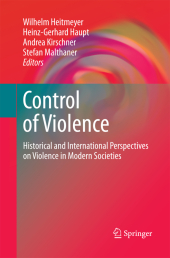 Neuerscheinungen 2014Stand: 2020-02-01 |
Schnellsuche
ISBN/Stichwort/Autor
|
Herderstraße 10
10625 Berlin
Tel.: 030 315 714 16
Fax 030 315 714 14
info@buchspektrum.de |

Heinz-Gerhard Haupt, Wilhelm Heitmeyer, Andrea Kirschner, Stefan Malthaner
(Beteiligte)
Control of Violence
Historical and International Perspectives on Violence in Modern Societies
Herausgegeben von Heitmeyer, Wilhelm; Haupt, Heinz-Gerhard; Malthaner, Stefan; Kirschner, Andrea
2011. 2014. xvi, 622 S. 235 mm
Verlag/Jahr: SPRINGER, BERLIN; SPRINGER NEW YORK; SPRINGER 2014
ISBN: 1-489-98872-6 (1489988726)
Neue ISBN: 978-1-489-98872-0 (9781489988720)
Preis und Lieferzeit: Bitte klicken
This book asserts that modern society will face an increasing loss of control over violence. It then defines "control" and "violence" before exploring what effects, or counter-effects, various forms of control can have on various forms of violence.
The Control of Violence in Modern Society, starts from the hypothesis that in modern society we will face an increasing loss of control over certain phenomena of violence. This leads to unpredictable escalations and violence can no longer be contained adequately by the relevant control regimes, such as police, state surveillance institutions, national repression apparatuses and international law. However, before investigating this hypothesis from an internationally and historically comparative perspective, the terms and "tools" for this undertaking have to be rendered more precisely. Since both "control" and "violence" are all but clear-cut terms but rather highly debatable and contested concepts that may take multiple connotations. The main question is whether an increase in certain forms of violence can be explained by the failure or, in turn, "overeffectiveness" of certain control mechanisms. It is asked, for instance, which contribution religion can make to limit violence and, in turn, which destructive potential religion might have in its fundamentalist form. Moreover, the concept of individual self-control as well as social institutions and strategies of collective disengagement and de-radicalization are investigated with regard to their potential for controlling violence.
The Control of Violence in Modern Society concludes with a re-examination of the hypothesis of a loss of control by specifying in what cases and under which circumstances we can speak of a loss of control over violence.


